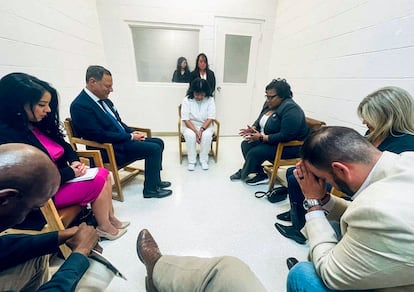Melissa Lucio: The Latina mom on death row
The American is facing execution on April 27 for killing her two-year-old daughter, who died in her sleep after falling down the stairs. But her defenders, which include Kim Kardashian and the French government, say she was wrongly convicted

Melissa Lucio has given birth to 14 children. But that’s not why the American citizen of Mexican origin has made the headlines. The 53-year-old is in the news because she is facing execution. If the execution is not postponed or stopped, she will receive a lethal injection on April 27, despite the mounting doubts over her guilt.
Lucio has been on death row since 2007, when she was convicted of killing her two-year-old daughter Mariah. The death happened in the family home in the town of Harlingen, in Cameron County, Texas, a few kilometers from the Mexican border with Tamaulipas. According to the family, the little girl died in her sleep, two days after falling down some stairs during a move when she was left unattended. The family – then made up of Melissa Lucio, her husband Robert Antonio Álvarez and 12 children (two more would be born later) – lived in extreme poverty, without water or electricity.
Mariah stopped eating after the fall and died in her sleep in her parents’ bed. When the emergency services received the report of her condition, the girl was no longer breathing. Prosecutors quickly charged Lucio with murder based on a confession that came after a five-hour interrogation, in which she denied responsibility more than 80 times, before breaking down and saying: “What do you want me to say? I’m responsible for it.”
The girl’s body had various bruises and contusions, which led authorities to claim she was a victim of child abuse. The prosecutors argued that Lucio had previously lost custody of some of her children and had a history of drug use. One of the detectives who led the investigation, Víctor Escalón Jr., even said Lucio’s hunched posture and refusal to make eye contact was reason for suspicion.

But Lucio’s defense claims that investigators did not consider evidence showing that Mariah had motor problems that could have caused her fall, and circulatory complications that would explain the bruises. The defense lawyers also argued that Lucio had been abused since she was six years old, a situation that continued in her adult life, which made her particularly vulnerable to the prosecution’s authoritarian and aggressive treatment. None of Lucio’s children, the oldest of whom is over 30, has ever accused her of abuse but rather rallied together to defend her. What’s more, the district attorney who originally pushed the case, Armando Villalobos, is today serving a 13-year sentence in federal prison for bribery and corruption.
Lucio’s legal battle has been going on for more than a decade, with several Texan courts upholding the conviction. But a 2020 documentary called The State of Texas vs Melissa put her case in the public spotlight. The documentary by journalist Sabrina Van Tassel highlighted the irregularities surrounding the verdict and triggered a wave of support from a number of high-profile names – celebrities such as Kim Kardashian and TV show presenter John Oliver; Republican and Democratic lawmakers from Texas and even the French government have called for her execution to be stopped.
In response to the growing outrage over the case, the current district attorney for Cameron County, Luis Sáenz, said he will try to stop the execution, but he did not provide details. Lucio’s life is at risk in a system where the weakest often face the crushing weight of the law, but rarely find justice.
Tu suscripción se está usando en otro dispositivo
¿Quieres añadir otro usuario a tu suscripción?
Si continúas leyendo en este dispositivo, no se podrá leer en el otro.
FlechaTu suscripción se está usando en otro dispositivo y solo puedes acceder a EL PAÍS desde un dispositivo a la vez.
Si quieres compartir tu cuenta, cambia tu suscripción a la modalidad Premium, así podrás añadir otro usuario. Cada uno accederá con su propia cuenta de email, lo que os permitirá personalizar vuestra experiencia en EL PAÍS.
¿Tienes una suscripción de empresa? Accede aquí para contratar más cuentas.
En el caso de no saber quién está usando tu cuenta, te recomendamos cambiar tu contraseña aquí.
Si decides continuar compartiendo tu cuenta, este mensaje se mostrará en tu dispositivo y en el de la otra persona que está usando tu cuenta de forma indefinida, afectando a tu experiencia de lectura. Puedes consultar aquí los términos y condiciones de la suscripción digital.









































